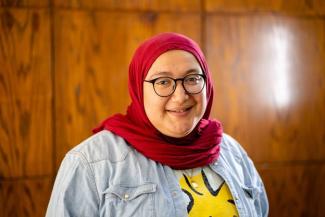When Covid-19 hit and people needed to order medication online, the Chefaa mobile app was ready. The founder, Doaa Aref, now manages a thriving business, and has overcome a lot to succeed as a female entrepreneur in Egypt.
Born and raised in Tanta, Egypt, Doaa, 34 years old, is the oldest daughter of an engineer and a teacher. Since she was young, Doaa always had a passion for business. When she was in elementary school, she would buy stickers from a nearby stationery store and sell them to her friends for a profit!
Fast forward a few years. Doaa finished her undergraduate diploma and signed up for an MBA at a private university in Alexandria. Simultaneously, she worked for an advertising agency in Cairo. For eight years, Doaa commuted daily from Tanta to Alexandria to Cairo and back, about a six-hour round trip every day. Seeing how stressful this daily commute was for Doaa, her father, against all cultural norms, encouraged her to leave her family home and move to Cairo.
Doaa packed her things and moved to the big city, where she rented an apartment and settled down. Everything seemed to be going her way until one day in 2016 when everything changed. Doaa was diagnosed with cancer and needed immediate surgery and ongoing treatment.
For a week after her Radioiodine therapy session, Doaa had to isolate herself. During this period, she was able to order everything she needed online, except for the thing her life depends on - her medicine. While spending long hours in hospitals’ waiting rooms, Doaa met other patients who shared her struggle of accessing medications.
Doaa was determined to solve this problem. “There has got to be a way!” she thought.
Doaa beat Cancer, but she needs medication on a permanent basis. She first created a WhatsApp group with a couple of pharmacies near her apartment. This idea quickly proved inefficient when medicine wasn’t available in any of the pharmacies, or when she received the wrong dosage of her prescription.
Doaa called her friend, Rasha Rady, who is a pediatrician, and discussed ways to solve this issue. They both dreamed of having a GPS-enabled app that allows patients to order and refill their medicine from the nearest pharmacy. Doaa made it her mission to research the idea and make it a reality. She found similar platforms already existed in the United States, and she dedicated her time to researching rules and regulations in Egypt. Although the laws that govern pharmaceutical work in Egypt dated back to the 1950s and 1960s, she pushed for ways to digitalize the process.
In July 2017, Doaa and Rasha decided to join their first startup accelerator competition and introduce their business idea. When they were eliminated early on in the competition, Doaa was ready to give up on her dream. “Who am I to change the world?” she thought. Luckily, she did not give up!
Doaa and Rasha applied to the U.S.-funded business accelerator, Flat6Labs, which was launched in 2011 with early-stage technical assistance from USAID. Flat6Labs is now the Middle East and North Africa (MENA) region’s leading seed and early stage venture capital firm. The accelerator fosters and invests in bright and passionate entrepreneurs with cutting-edge tech-driven ideas. Through Flat6Labs, Doaa and Rasha gained strategic mentorship, a creative workspace, entrepreneurship-focused business training, and access to a network of mentors and investors.
With this support, Doaa and Rasha’s Chefaa (which means “healing” in Arabic) app was born in 2017. And quickly, their idea of an online pharmaceutical app began to be adopted by other startups. The competition became ferocious, and that’s when Doaa faced a setback. Rival companies started a rumor that went viral on social media claiming that Chefaa was a scam. Anonymous emails were sent to investors warning them against Chefaa. Doaa was disheartened. People who knew Doaa and her platform came to her defense and, in a very interesting turn of events, Chefaa garnered more positive attention than ever before.
When the COVID-19 crisis unfolded, most people resorted to online shopping to avoid the risks of crowding in public areas. Luckily, Chefaa was ready to deliver medicines to people’s doorsteps.
Despite all of her success, Doaa still experiences occasional self-doubt. It’s tough being a young female entrepreneur in a male-dominated business environment. Instead of letting this get her down, Doaa uses her platform as CEO to empower women. She creates an enabling environment at her 69 -person company by offering everyone equal opportunities and making women feel safe at work. As a result, 60 percent of her employees are women.
Today, Chefaa supports hundreds of thousands of patients across the MENA region. The Chefaa platform offers 24/7 support by licensed pharmacists and the first Arabic-speaking pharmaceutical blog to educate the public about responsible use of medication. Chefaa was recently selected to join Google’s prestigious startup accelerator program for the region.
# # #
Through USAID, the U.S. government played a key role in transforming the entire entrepreneurship ecosystem in Egypt by establishing some of the country’s first business incubators and attracting private and public sector partners to join the initial U.S. investment. The United States. has helped more than 10,000 Egyptians strengthen their businesses through mentorship programs, incubators, and accelerators. Women represent a largely untapped resource in Egypt’s economy – only 15 percent of all businesses are owned by women. The IMF estimates that Egypt’s GDP would increase by 34 percent – if female employment rates rose to match men’s.

الصورة: تشارلز كوبلاند/ الوكالة الأمريكية للتنمية الدولية
